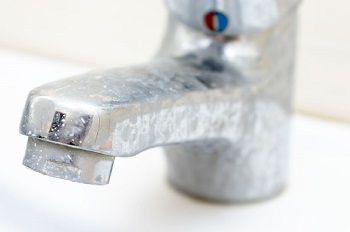You have guests arriving in an hour. The dinner that you spent all day on is perfect and ready to serve. The house is spotless, but the same can’t be said for your dishes. You set the table and notice that there are spots on your glasses and dishware.
Spots on your dishes are caused by hard water leaving mineral deposits, excessive salt in your water leaving salt deposits, using too much detergent, using the wrong type of detergent, low-temperature water, overloading your dishwasher, or sulfur in your water.
There can be many things in the water that your dishwasher uses to clean your dishware. And depending on what is in your water, the detergent that you are using may not do a very good job of cleaning your dishes.
But there are ways to get your dishes cleaner and spotless, so don’t run out and get a new dishwasher just yet! Try these tips for getting your dishes spotless with your existing dishwasher.
Hard water is the most common cause of spots on your dishes.

Hard water is when you have minerals in your water that are considered to be hard. Hard minerals like calcium and manganese do not dissolve in water and therefore will end up on your dishware after the water is gone.
Hard water spots are usually round and look similar to a bubble, as the outside of the spot is more defined than the inside.
This is because as the water drop dries, the minerals settle more towards the outside of the drop than in the center.
Hard water spots often need a fair amount of scrubbing to remove with water alone. Using a small amount of white vinegar will make removing hard water spots considerably easier.
Great Tip!
If you find that the spots on your dishware are due to hard water, getting a reasonably priced water softener is the ideal solution.
But if you are not ready to get a water softener, try putting a dishwasher safe bowl of white vinegar in the top rack of your dishwasher.
Just put 1 cup of regular white vinegar into a dishwasher safe bowl, place it towards the center of the top rack of your dishwasher, and run your dishwasher in the regular wash mode.
Dry your dishes as soon as your dishwasher is done and they should come out sparkling clean. A simpler way to get a similar result is to use a hard water dishwasher detergent.
Why will white vinegar help prevent spots on my dishes?
White vinegar is a mild acid that will make the water in your dishwasher slightly acidic. Water that is slightly acidic will dry quicker which makes water less likely to form droplets of water on your dishware.
If droplets do not form on your dishware, the hardness in your water will not become concentrated into small areas which will later be seen as spots.
Using a rinsing agent will also help the hard water to rinse off your dishware more easily, less water left on your dishware after washing means less spotting when your dishware dries.
Does your water taste salty? Salt can leave white spots on your dishes.
Much in the same way that hard minerals in your water can leave mineral deposits, water that is high in salt content will leave a white ring that looks very much like a hard water ring.
If you notice white spots on your dishes, but don’t believe that they should be from hard water because you have a water softener, it might be salt.
First, check to see if your water is hard. You can use a very simple hard water test kit to determine if your water softener is softening your water properly.
If you find that your water is soft, you can next check if your water is high in Total Dissolved Solids (TDS). TDS in water is often made up of salt in the water.
You can check your waters TDS with a TDS Meter to determine if your water has excessive salt.
A TDS level of a few hundred is perfectly normal, and should not lead to spotting on your dishes.
But if you find that your water has a high TDS count of more than a few hundred, the excessive salt in your water can remain behind after rinsing and leave spots on your dishes.
How can you tell if you have hard water or saltwater spots?
Hard water spots and saltwater spots look very much the same. They both can make your glassware unsightly, and leave your dishes looking as if they have not been properly cleaned.
A simple way to distinguish a hard water spot from a saltwater spot is by how easily it comes off.
If the spots on your dishes come off very easily, with just a bit of water, they are most likely deposits of salt.
But if they require a fair amount of scrubbing to get them off, they are probably caused by hard water.
Try using a little less dishwasher detergent.
Using more detergent than is necessary means more detergent needs to be rinsed away. Some people see a few spots on their dishes and think that using a little more detergent will help clean their dishes better.
Your dishwasher is programmed to rinse out the recommended amount of detergent. So using more detergent than recommended, may leave some detergent behind, leaving detergent spots on your dishes.
Dry detergent is more likely to get left behind if you use a bit more than required because it needs to be dissolved into the water.
And if your water is not hot enough, it may have a hard time dissolving all of the detergents that you have added.
Detergent that doesn’t get dissolved during the wash cycle will be harder to get rid of during the rinse cycle.
You may need a different detergent.
Despite what some detergent manufacturers like to tell you, not all dishwasher detergents are equal.
Most dishwasher detergents work very well when you have soft water, but if you have even slightly hard water, some detergents will work better than others.
Hard water dishwasher detergents are specifically designed to counteract the effects of hard water. They are able to clean better in hard water and will rinse away easier when they are done cleaning your dishes.
Make sure your water temperature is high enough.
Hot water will evaporate off of your dishes much quicker and easier than colder water will. If you haven’t run your hot water for a while, there may only be cold water in your pipes.
Since your dishwasher only uses a small amount of water for its wash cycle, and then another small amount for its rinse mode, the water might never get up to the proper temperature to clean and rinse your dishes correctly.
If your dishwater has a “High Temperature” mode, try using it to make sure the water being used to clean your dishes is up to temperature.
I also recommend turning on the hot water in a nearby sink until the water becomes hot, to make sure that the water getting to your dishwasher will clean your dishes as well as it can.
Don’t overload your dishwasher.
Overfilling your dishwasher will make your dishwasher detergent have too much to clean effectively, and adding extra detergent can leave spots if the detergent does not get rinsed away thoroughly.
It is better to under-load your dishwasher and do multiple loads than to overload it if you have any problems with spots on your dishes.
Also, overloading your dishwasher will divert the water away from making contact with all of the surfaces of your dishes.
If you have some larger than normal pots and pans that need to be washed, put them in a separate load so the dishwasher can do its job correctly.
Are the spots only on your silverware? It may be sulfur.
Even small levels of sulfur in water can react with your silverware or dishes that are made out of silver.
When sulfur comes into contact with silver, it can create Silver Sulfide. Silver Sulfide will leave your silver looking dingy, with black spots wherever the sulfur was able to settle.
Drying your silver immediately after washing is the best way to prevent this spotting. There are also water treatment systems that can remove the sulfur from the water before it ever gets to your dishwasher.
These are the most common causes of spots on dishes, and fortunately, the spotting can be prevented or treated. Find the reason for the spotting, and you should be able to stop it from happening in the future.




I’m looking at installing a saltless water conditioner. People say I will get more spots on my faucets and glassware and on the shower doors. Should I put in a water softener instead?
Hello Linda and thank you for the question.
A saltless water conditioner does not actually remove the minerals that cause spotting from your water.
To remove hard minerals from your water that cause hard water spotting, you will need to use a water softener.
I hope this was helpful.
Paul